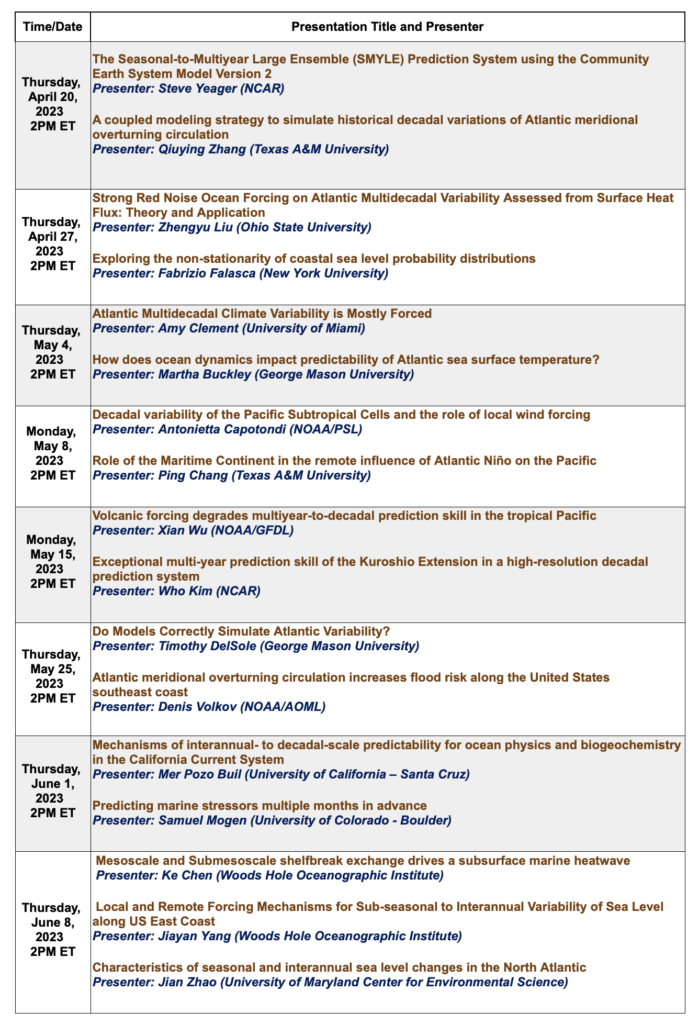The 2023 Fall INARCH Workshop is by invitation only and will be held October 9–11, 2023 in Stanley, Idaho, USA at the Mountain Village Resort.
The NOAA Climate Variability and Predictability (CVP) Program is hosting a webinar series on Decadal Climate Variability and Predictability that will highlight the recent results from the CVP-funded projects. The goal of these modeling studies is to identify the state, mechanisms, and sources of climate predictability on the interannual to decadal timescale. This research will lead to future improvements in skillful decadal prediction systems for climate—ocean and atmosphere.
Please use this link to register. You only need to do so once, the GoToWebinar platform will automatically register you for all 8 sessions. You should receive a confirmation email shortly after.
The NOAA Climate Variability and Predictability (CVP) Program is hosting a webinar series on Decadal Climate Variability and Predictability that will highlight the recent results from the CVP-funded projects. The goal of these modeling studies is to identify the state, mechanisms, and sources of climate predictability on the interannual to decadal timescale. This research will lead to future improvements in skillful decadal prediction systems for climate—ocean and atmosphere.
Please use this link to register. You only need to do so once, the GoToWebinar platform will automatically register you for all 8 sessions. You should receive a confirmation email shortly after.
The NOAA Climate Variability and Predictability (CVP) Program is hosting a webinar series on Decadal Climate Variability and Predictability that will highlight the recent results from the CVP-funded projects. The goal of these modeling studies is to identify the state, mechanisms, and sources of climate predictability on the interannual to decadal timescale. This research will lead to future improvements in skillful decadal prediction systems for climate—ocean and atmosphere.
Please use this link to register. You only need to do so once, the GoToWebinar platform will automatically register you for all 8 sessions. You should receive a confirmation email shortly after.
The NOAA Climate Variability and Predictability (CVP) Program is hosting a webinar series on Decadal Climate Variability and Predictability that will highlight the recent results from the CVP-funded projects. The goal of these modeling studies is to identify the state, mechanisms, and sources of climate predictability on the interannual to decadal timescale. This research will lead to future improvements in skillful decadal prediction systems for climate—ocean and atmosphere.
Please use this link to register. You only need to do so once, the GoToWebinar platform will automatically register you for all 8 sessions. You should receive a confirmation email shortly after.
The NOAA Climate Variability and Predictability (CVP) Program is hosting a webinar series on Decadal Climate Variability and Predictability that will highlight the recent results from the CVP-funded projects. The goal of these modeling studies is to identify the state, mechanisms, and sources of climate predictability on the interannual to decadal timescale. This research will lead to future improvements in skillful decadal prediction systems for climate—ocean and atmosphere.
Please use this link to register. You only need to do so once, the GoToWebinar platform will automatically register you for all 8 sessions. You should receive a confirmation email shortly after.
The NOAA Climate Variability and Predictability (CVP) Program is hosting a webinar series on Decadal Climate Variability and Predictability that will highlight the recent results from the CVP-funded projects. The goal of these modeling studies is to identify the state, mechanisms, and sources of climate predictability on the interannual to decadal timescale. This research will lead to future improvements in skillful decadal prediction systems for climate—ocean and atmosphere.
Please use this link to register. You only need to do so once, the GoToWebinar platform will automatically register you for all 8 sessions. You should receive a confirmation email shortly after.
The NOAA Climate Variability and Predictability (CVP) Program is hosting a webinar series on Decadal Climate Variability and Predictability that will highlight the recent results from the CVP-funded projects. The goal of these modeling studies is to identify the state, mechanisms, and sources of climate predictability on the interannual to decadal timescale. This research will lead to future improvements in skillful decadal prediction systems for climate—ocean and atmosphere.
Please use this link to register. You only need to do so once, the GoToWebinar platform will automatically register you for all 8 sessions. You should receive a confirmation email shortly after.
The NOAA Climate Variability and Predictability (CVP) Program is hosting a webinar series on Decadal Climate Variability and Predictability that will highlight the recent results from the CVP-funded projects. The goal of these modeling studies is to identify the state, mechanisms, and sources of climate predictability on the interannual to decadal timescale. This research will lead to future improvements in skillful decadal prediction systems for climate—ocean and atmosphere.
Please use this link to register. You only need to do so once, the GoToWebinar platform will automatically register you for all 8 sessions. You should receive a confirmation email shortly after.
Following on from the 2nd cloud organisation workshop (WCO2) that took place in Utrecht in 2022, this workshop aims to bring together all these tools to assess our present understanding of convective organization.
Topics:
- Convective self-aggregation in idealized experiments
- Precipitation extremes associated with organized convection
- Using idealized models to improve our understanding of aggregation
How can we better use observations? - Impact of aggregation and organization changing on climate sensitivity
- Aggregation in global cloud resolving model experiments
For more information visit https://indico.ictp.it/event/10204/


